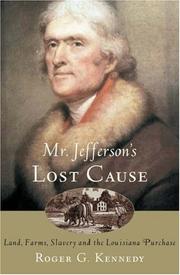Check nearby libraries
Buy this book

Thomas Jefferson advocated a republic of small farmers -- free and independent yeomen. And yet as president he presided over a massive expansion of the slaveholding plantation system -- particularly with the Louisiana Purchase -- squeezing the yeomanry to the fringes and to less desirable farmland. Now Roger G. Kennedy conducts an eye-opening examination of that gap between Jefferson's stated aspirations and what actually happened. Kennedy reveals how the Louisiana Purchase had a major impact on land use and the growth of slavery. He examines the great financial interests (such as the powerful land companies that speculated in new territories and the British textile interests) that carried the day against slavery's many opponents in the South itself (Native Americans, African Americans, Appalachian farmers, and conscientious opponents of slavery). He describes how slaveholders' cash crops (first tobacco, then cotton) sickened the soil and how the planters moved from one desolated tract to the next. Soon the dominant culture of the entire region -- from Maryland to Florida, from Carolina to Texas -- was that of owners and slaves producing staple crops for international markets. The earth itself was impoverished, in many places beyond redemption. None of this, Kennedy argues, was inevitable. He focuses on the character, ideas, and ambitions of Thomas Jefferson to show how he and other Southerners struggled with the moral dilemmas presented by the presence of Indian farmers on land they coveted, by the enslavement of their workforce, by the betrayal of their stated hopes, and by the manifest damage being done to the earth itself. - Jacket flap.
Check nearby libraries
Buy this book

Previews available in: English
Subjects
History, Politics and government, Political aspects of Land settlement, Plantation owners, Land settlement, Influence, Slavery, Extension to the territories, Territorial expansion, Family farms, Louisiana Purchase, Political activity, Views on slavery, Jefferson, thomas, 1743-1826, Slavery, united states, United states, territorial expansion, United states, politics and government, 1775-1783, United states, politics and government, 1783-1865, Political aspects, Biographies & autobiographies, Presidents & heads of statePeople
Thomas Jefferson (1743-1826)Places
United StatesShowing 4 featured editions. View all 4 editions?
| Edition | Availability |
|---|---|
|
1
Mr. Jefferson's Lost Cause: Land, Farmers, Slavery, and the Louisiana Purchase
August 10, 2004, Oxford University Press, USA
in English
0195176073 9780195176070
|
zzzz
Libraries near you:
WorldCat
|
|
2
Mr. Jefferson's lost cause: land, farmers, slavery, and the Louisiana Purchase
2003, Oxford University Press
in English
0195153472 9780195153477
|
zzzz
Libraries near you:
WorldCat
|
|
3
Mr. Jefferson's lost cause: land, farmers, slavery, and the Louisiana Purchase
2003, Oxford University Press
in English
0195153472 9780195153477
|
aaaa
Libraries near you:
WorldCat
|
|
4
Mr. Jefferson's lost cause: land, farmers, slavery, and the Louisiana Purchase
2002, Oxford University Press
in English
0195153472 9780195153477
|
zzzz
Libraries near you:
WorldCat
|
Book Details
Table of Contents
Edition Notes
Includes bibliographical references (p. 312-335) and index.
Classifications
The Physical Object
ID Numbers
Community Reviews (0)
Feedback?| August 22, 2024 | Edited by MARC Bot | import existing book |
| December 19, 2023 | Edited by ImportBot | import existing book |
| November 15, 2023 | Edited by MARC Bot | import existing book |
| August 1, 2020 | Edited by ImportBot | import existing book |
| October 16, 2009 | Created by WorkBot | add works page |












